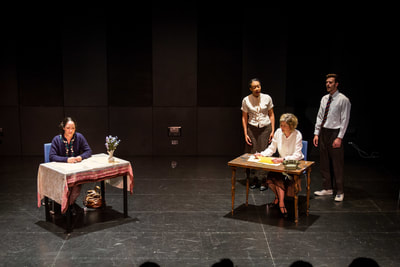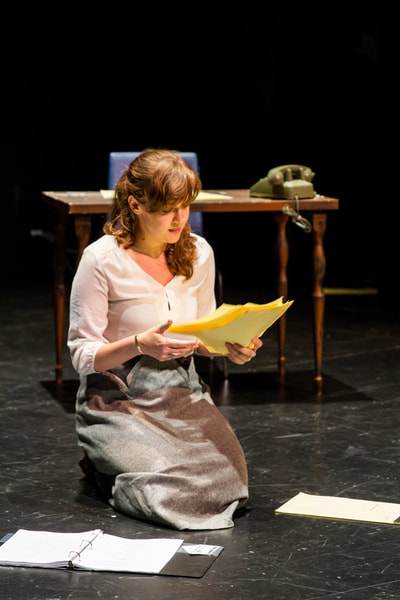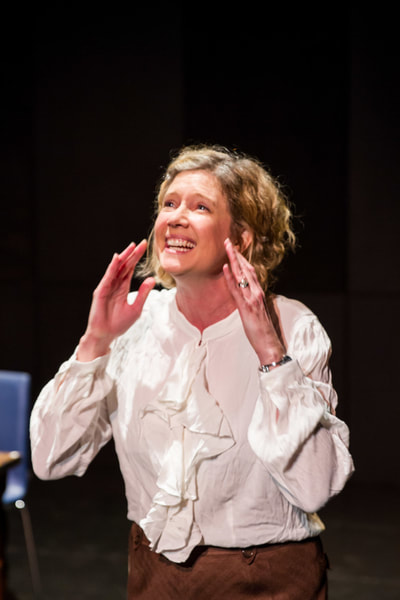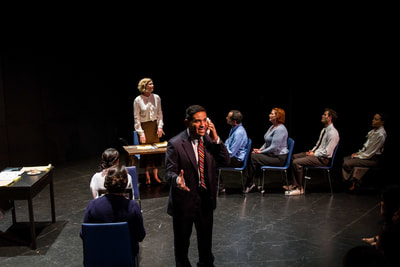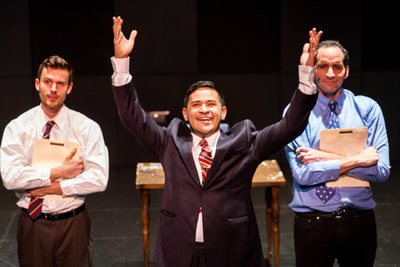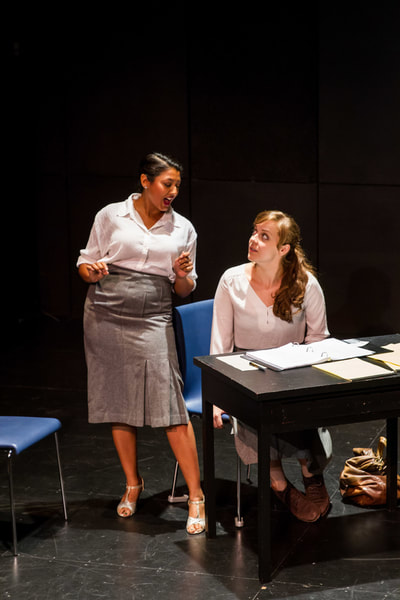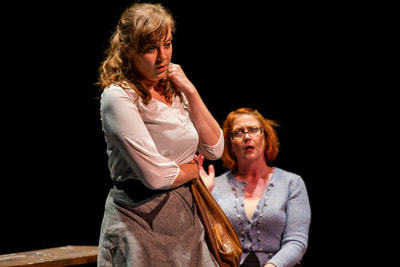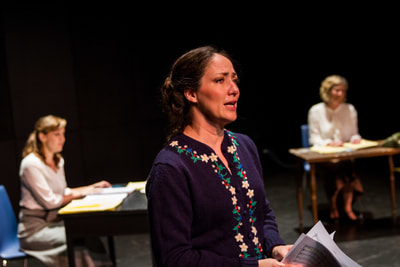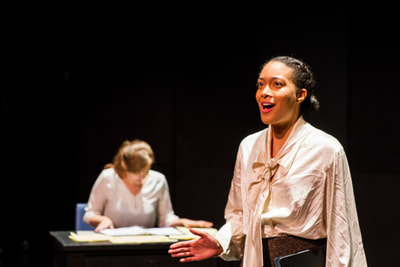A brief history of RACHEL: A New Musical About Rachel Carson
Sister and brother team Jessie and Jared Field began working on their first musical theatre collaboration in 2010, when Jessie was just 19. That year’s Gallup poll trumpeted “Environmental concerns hit 20-year low in US!” while the worst oil spill in U.S. history poured 210,000 gallons of oil a day into the Gulf of Mexico. Telling the story of Rachel Carson, who believed that people would fight to save nature if they were invited to fall in love with it, seemed urgent and timely.
An early draft, then called Always, Rachel was performed as Jessie’s senior thesis at Brandeis in 2013. That year, President Obama gave his first major policy speech about climate change, the Sierra Club embraced civil disobedience for the first time to bring attention to the importance of taking action on global warming, and public concern about issues ranging from fracking to genetically modified crops. Although the issues were frightening, it was a time of optimism—when it felt like Miss Carson’s words might once again inspire the world to take action for our environment.
In 2014, when Rachel was a selection of the New York Musical Theatre Festival’s Next Link series, the World Health Organization asserted that air pollution was the world’s most dangerous environmental health risk and was responsible for over 7 million deaths a year. As extreme weather events jeopardized water supplies across the world, the U.S. and China both rolled out comprehensive plans to improve air quality. The state of California banned plastic bags, and the People’s Climate Change March in New York, expected to draw 100,000 marchers, was reported to draw over 300,000. President Obama wrote: “Our citizens keep marching. We cannot pretend we do not hear them. We have to answer the call.” it was a time of hope for environmental activists.
I joined this project in 2015, when we presented a 9-actor version at the Fresh Fruit Festival. We were adamant about drinking water and coffee from eco-tumblers in rehearsal, and were proud that the LGBTQ themes of the production were greeted with such enthusiasm. All across the globe, people celebrated the signing of the Climate Accord in Paris. Locally there were bans on climate-impacting food waste (France and Seattle) and microbeads contaminating our oceans (U.S.) We felt that the environmental themes of the piece were reflected in the world around us, and our goal was simple: to amplify Miss Carson’s message so others could hear her call.
Now, in 2017, the world is different. We joke that this production, with its 4 onstage actors (and 2 offstage voices) has “Less Men; More Science”—but really it is stripped down and ready to join the fight. It’s ready to tell Rachel’s story in theaters like this one, but also to go on the road into a country where climate change deniers fight to roll back air quality standards, where the Environmental Protection Agency is lifting restrictions on use of dangerous pesticides, and where our national parks and waterways are at risk. We need this story now more than ever.
Rachel Carson used her art—as a writer and storyteller—to invite others to care deeply about the natural world in a time of deep crisis. She reminds us that one person—one solitary human, told that she was incapable of understanding the science behind her powerful work, criticized as hysterical, a communist, a fraud, and marginalized because she was a woman—had the power to change the way an entire country thinks, and to inspire action and change.
Sister and brother team Jessie and Jared Field began working on their first musical theatre collaboration in 2010, when Jessie was just 19. That year’s Gallup poll trumpeted “Environmental concerns hit 20-year low in US!” while the worst oil spill in U.S. history poured 210,000 gallons of oil a day into the Gulf of Mexico. Telling the story of Rachel Carson, who believed that people would fight to save nature if they were invited to fall in love with it, seemed urgent and timely.
An early draft, then called Always, Rachel was performed as Jessie’s senior thesis at Brandeis in 2013. That year, President Obama gave his first major policy speech about climate change, the Sierra Club embraced civil disobedience for the first time to bring attention to the importance of taking action on global warming, and public concern about issues ranging from fracking to genetically modified crops. Although the issues were frightening, it was a time of optimism—when it felt like Miss Carson’s words might once again inspire the world to take action for our environment.
In 2014, when Rachel was a selection of the New York Musical Theatre Festival’s Next Link series, the World Health Organization asserted that air pollution was the world’s most dangerous environmental health risk and was responsible for over 7 million deaths a year. As extreme weather events jeopardized water supplies across the world, the U.S. and China both rolled out comprehensive plans to improve air quality. The state of California banned plastic bags, and the People’s Climate Change March in New York, expected to draw 100,000 marchers, was reported to draw over 300,000. President Obama wrote: “Our citizens keep marching. We cannot pretend we do not hear them. We have to answer the call.” it was a time of hope for environmental activists.
I joined this project in 2015, when we presented a 9-actor version at the Fresh Fruit Festival. We were adamant about drinking water and coffee from eco-tumblers in rehearsal, and were proud that the LGBTQ themes of the production were greeted with such enthusiasm. All across the globe, people celebrated the signing of the Climate Accord in Paris. Locally there were bans on climate-impacting food waste (France and Seattle) and microbeads contaminating our oceans (U.S.) We felt that the environmental themes of the piece were reflected in the world around us, and our goal was simple: to amplify Miss Carson’s message so others could hear her call.
Now, in 2017, the world is different. We joke that this production, with its 4 onstage actors (and 2 offstage voices) has “Less Men; More Science”—but really it is stripped down and ready to join the fight. It’s ready to tell Rachel’s story in theaters like this one, but also to go on the road into a country where climate change deniers fight to roll back air quality standards, where the Environmental Protection Agency is lifting restrictions on use of dangerous pesticides, and where our national parks and waterways are at risk. We need this story now more than ever.
Rachel Carson used her art—as a writer and storyteller—to invite others to care deeply about the natural world in a time of deep crisis. She reminds us that one person—one solitary human, told that she was incapable of understanding the science behind her powerful work, criticized as hysterical, a communist, a fraud, and marginalized because she was a woman—had the power to change the way an entire country thinks, and to inspire action and change.
Photos by Michael Markham
